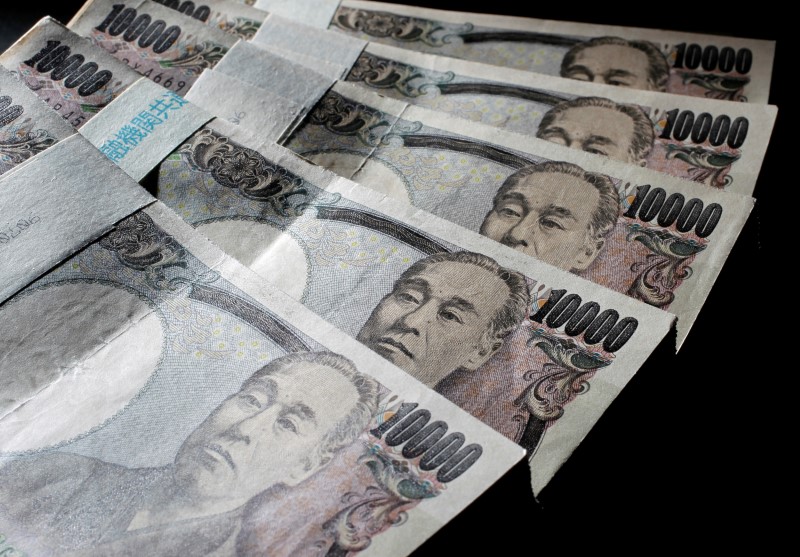By Leika Kihara
TOKYO (Reuters) - The Bank of Japan would deepen negative interest rates to thwart any sharp spikes in the yen, which the central bank sees as an obstacle to stoking inflation and economic growth, sources familiar with its thinking say.
While achieving its inflation target remains the BOJ’s top policy priority, the Bank’s dwindling tool-kit means an abrupt yen rise – rather than sluggish inflation – would be the more imminent trigger for further monetary easing, the sources say.
"If the excessive yen rises hurt the economy, the BOJ won't hesitate to ease," said one of the sources. "What's important is to sustain the economy's momentum to hit 2 percent inflation," said another source, referring to the Bank’s inflation target.
The dollar was trading at 101.40 yen on Monday, just above the psychological barrier of 100 that was almost breached when the pair fell to 100.085 last week, its weakest since Aug. 26. Despite Japan's weak economy and ultra-low interest rates, investors buy the yen as a safe haven in times of global financial stress, knowing Japan can use its huge current account surplus to pay off its debts.
NOT MUCH ROOM
For the past three-and-a-half years, the BOJ has relied on massive injections of money into the economy to keep the yen weaker.
But last month, the BOJ switched the focus of its stimulus program from buying bonds and risk assets like trust funds investing in stocks to targeting yields on a range of bond maturities.
In January, the BOJ pushed interest rates on some bank reserves with the central bank below zero, hoping real interest rates would fall and thus stimulate consumption and investment.
But there is not much room to deepen negative interest rates or cut the 10-year bond yield target below zero, given the damage such moves could inflict on Japan's banking system.
Analysts doubt whether the BOJ has much ammunition left to counter yen gains driven by various external events, including the risk the U.S. central bank may trigger a dollar fall by delaying a rate hike now expected at the end of the year.
"The BOJ is in a tough spot because it doesn't have the ammunition left to do aggressive easing," said Hideo Kumano, a former central banker who is now chief economist at Dai-ichi Life Research Institute.
"Any future easing would be defensive, not offensive, and in response to external events like a yen spike," Kumano said.
AN "ABENOMICS" SUCCESS
BOJ Governor Haruhiko Kuroda is inclined to resort to monetary easing to contain rapid rises in the yen, people close to him say. His experience battling Japan's prolonged deflation as a top finance ministry official in the late 1990s makes him a strong believer in the need to rein in excessive yen rises, they say.
Last week, Kuroda told business leaders in the western Japan city of Osaka, home to electronic giants like Panasonic Corp (T:6752), the BOJ will watch yen moves with caution and take them into account in guiding monetary policy.
Kuroda's aggressive monetary stimulus program helped the yen weaken nearly 40 percent in the three years to mid-2015, when the dollar approached 126 yen, earning praise as one of the few successes of Prime Minister Shinzo Abe's stimulus policies known as "Abenomics".
But the yen has reversed course, rising 20 percent so far this year and weighing on corporate profits and exports.
That's making big manufacturers more pessimistic. Those polled in the BOJ's "tankan" survey cut this fiscal year's average dollar/yen forecast to 107.92 from 111.41 three months ago.
The new forecast is still higher than recent levels around 100 yen, a sign corporate profits could be revised down further.
COMPETITIVE DEVALUATIONS
BOJ officials publicly deny their ultra-easy policy is aimed at weakening the yen, as it would go against a Group of 20 agreement to avoid competitive currency devaluations. Washington has warned Tokyo against currency manipulation and disagreed with Japan's view that recent yen rises were disorderly.
One of the priorities for BOJ policymakers drafting last month's policy overhaul was to prevent markets from boosting the yen on expectations the bank would be withdrawing stimulus.
That was partly why the BOJ, even in shifting its policy target to interest rates from the pace of money printing, kept a pledge to expand its massive balance sheet by maintaining its aggressive bond purchases, the sources said.
In a reminder to speculators not to push up the yen, the BOJ included a reference in last month's policy statement that its balance sheet would expand to 100 percent of the size of Japan's economy a year from now - five times the ratio of the Federal Reserve's and the European Central Bank's balance sheets.
"It wouldn't make much sense for the yen to rise when the BOJ's balance sheet is so big," a central bank official said.

The decision to set a zero percent target for the 10-year government bond yield also reflects the BOJ's view that the Japan-U.S. yield differential for that zone tends to have a strong influence on recent dollar/yen moves, the sources said.